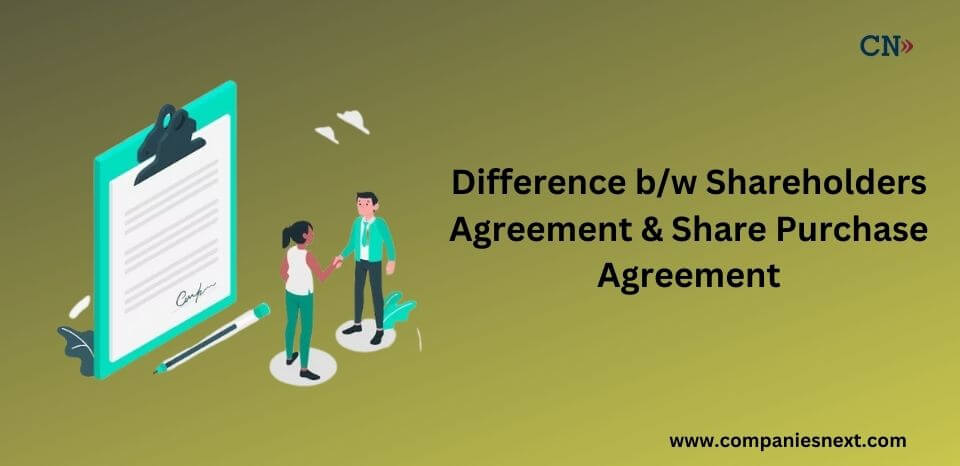Published Sat, 04 Mar 2023 Corporate Law

The Shareholder's Agreement is generally used to resolve disputes between the corporation and the Shareholder. The Share Purchase Agreement, on the other hand, is a document that justifies the exchange of shares held by the Buyer and Seller. We'll examine some key distinctions between these two agreements below:
A Share Purchase Agreement is a legal and binding contract between a seller and a buyer. In the contract, they can be referred to as the seller and the buyer. The contract specifies the precise quantity of sale shares at the specified price. This agreement confirms that the sale of shares was made on pre-determined terms and conditions as mutually agreed upon.
It provides safeguards for the buyer, such as the disclosure of critical company information. It basically contains clauses protecting the buyer from seller post-sale competition and confidentiality restrictions.
A share purchase agreement should be used when a firm or an individual is buying or selling shares in the company from another company or individual. A share purchase agreement can be used, for instance, to buy out the stake of an existing partner in a firm by another partner if there are two partners with equal shares.
A share purchase agreement contains details regarding the company whose shares are being transferred, the seller and the buyer of the shares, the applicable law, the kind of shares being sold, the quantity of shares being sold, and the amount being paid. This agreement also contains payment information and the date on which the agreement closes.
It is a legal and binding contract
All parties to SPA are equally covered by specific warranties specified in the agreement
Provides clarity in transaction and respective proportion of shares allocated to the buyer or the entity.
SPA serves as the first point of reference, in case of any breaches or any misunderstanding arising between the parties in near future.
Definitions and interpretations
The parties to the agreement
Information on the company selling shares
Purchase price of the shares
Title
Timetable for completion
Warranties
Restrictions following completion
Confidentiality requirements
Governing law
Dispute resolution
It is an official contract between the Company and its shareholders that establishes the rules for how a business will be operated. This agreement provides for an arrangement that regulates the relationship between the shareholders, the management of the company, ownership of the shares, rights, obligations, and protection of the shareholders. It may also command the way in which the company functions. A shareholder agreement is a crucial pillar on which to create a corporation when beginning a business that involves more than one individual putting money in the organization. A shareholder agreement must be comprehensive. It should specify how the company will operate, how shareholder disputes will be resolved, and define the obligations and advantages of each shareholder.
A shareholders agreement is necessary when a corporation is established and more than one individual will be contributing money to the business. This agreement should be created and signed as soon as a corporation is founded to avoid any complications or confusion during the company's formation.
Even if a Company has a few investors, a shareholders agreement should be executed as a SHA would safeguard everyone's rights and interests and ensure that there always exists a straightforward, impartial method of resolving disputes.
It is a good practice to have a shareholders agreement even if a corporation has articles of association that describe the rules and regulations for the business for further clarity and security.
SHA safeguards rights of the Shareholders.
It defines the different roles and responsibilities of the Shareholders
It provides predetermined dispute resolution procedures hereby saving money, time, and energy.
It defines and regulates the relationship between the management of the company and its shareholders.
Prohibits minority shareholders from transferring their shares to competitors or other parties.
Details of the Parties entering into this Agreement
the total authorized capital of the Company
the Shares held by each Shareholder and their percentage of Company ownership
the details of the first refusal right by other Shareholders before transferring any Shares
"drag-along rights" and "tag-along rights"
provisions related to the rights and obligations of the Directors/Board
details related to the management of the Company
non-compete clause
non-solicit clause
Board of Directors
Reserved Matters
Termination
Dispute Resolution
Conclusion
Share Purchase Agreements and Shareholders Agreements continue to be two of the most helpful contracts among the plethora of agreements and contracts available for businesses of all sizes and stages of development because they speed up the process of defining the proper exercise or refrain of power by shareholders and, more importantly, because they define the terms of investment to new partners. A shareholders agreement explains a new shareholder's rights over the firm, whereas a share purchase agreement lays out a contract for those looking to buy ownership in a company.